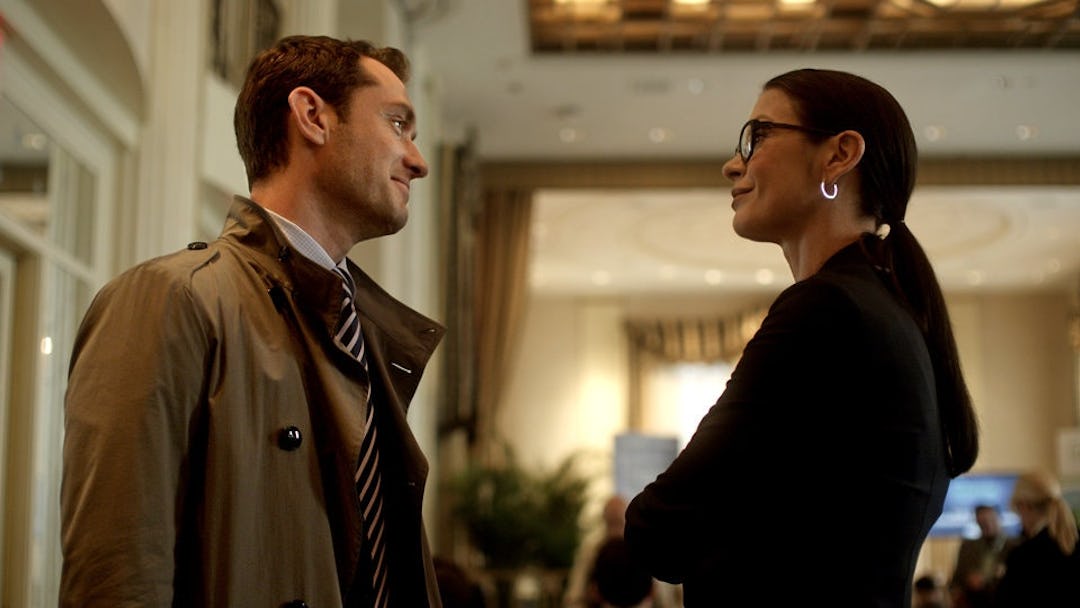In the 24 years since his debut feature sex, lies, and videotape won the Palme d’Or at the Cannes Film Festival, Steven Soderbergh has directed 26 features, plus a handful of shorts and television episodes — a spree of productivity and creativity that puts most of his peers to shame. (Example: he directed seven films in the period between Quentin Tarantino’s third and fourth.) And now, it would appear, he’s done. After teasing and threatening for months, it seems that his latest theatrical release — the thriller Side Effects, out today — is his last, with only the HBO Liberace biopic Behind the Candelabra on deck. So why, then, does Side Effects feel so anti-climactic?
Which is not to say that it is a bad film — far from it. Written with panache by Soderbergh’s frequent late-period collaborator Scott Z. Burns (The Informant!, Contagion) and photographed by the director (as usual, under the pseudonym Peter Andrews) in his customary cool, methodical style, Side Effects is a fascinating exercise in mood and dread. It concerns Emily Taylor (Rooney Mara), the wife of a Wall Street type (Channing Tatum) who’s just finishing a five-year stretch for insider trading. Her future, at long last, appears bright — yet just as things are perking up, her clinical depression begins to reappear. Her new psychiatrist (Jude Law) has her try some medication. And that’s where things get sticky.
More than that I won’t tell; much emphasis is being placed on preserving the turns of the twisty plot, and to be sure, the film’s initial curveballs land with a wallop. The film’s first half, which works up a considerable head of narrative momentum thanks not only to the direction and playing, but the urgent score (by Thomas Newman) and trim editing (Soderbergh again, as Mary Ann Bernard), is among the best of Soderbergh’s recent work.
The trouble is the second half, because as Burns and Soderbergh begin to explain things, to unravel the tense knots they’ve tied early on, the picture becomes somewhat more conventional — and less exciting. The convoluted plot holds water (pretty much), and the eroticism is considerably more explicit than director’s standard (which is fine). The performances are skillful, particularly Rooney Mara’s; she acts the part of a woman in a haze without acting through a haze herself, which is tricky. It is, when the end credits roll, a sold, sturdy little mystery — sleek, and more than a little junk-foody.
So why did I leave it so unsatisfied? I’ll own up, and take the blame: I was expecting, probably unfairly, some sort of a definitive “closing statement” out of the final theatrical feature for one of our generation’s most compelling filmmakers. The movie’s fundamentally “beach read” nature (promotional interviews with the filmmaker have pinpointed such influences as Fatal Attraction and Jagged Edge) means it’s not a summation — it’s a one-off.
But then again, that’s what much of his recent work has been. Soderbergh has spent most of the young decade going left when we were expecting him to go right — his last three films have all been, to some degree, larks. We weren’t expecting an Oscar-winning director to make a bone-crunching action movie, or an all-star disaster epic, or a male stripper rom-com. The subject of those films, as much as their individual plotlines, was his involvement in them; what, exactly, was he doing mucking around in these slightly disreputable genres? (Something interesting, usually.) Had Side Effects come in the middle of that run, instead of at the end of it, might it feel more satisfying? Quite possibly.
But I doubt Soderbergh is all that interested in such concerns; he seems a filmmaker unbothered by matters of his “legacy,” beyond it being that of a productive, versatile, talented journeyman. (Mick LaSalle’s recent comparison to Howard Hawks seems, to this fan of both directors, heartily appropriate.) He was never much moved by outcomes anyway — throughout his filmography, from the heists of the Ocean’s movies to the revolutions of Che to the doll assemblage of Bubble, he’s had a singular interest in process, in how things are done, mirrored by his transparency and demystification of his own efforts behind the camera. His audio commentaries were chatty and self-deprecating; he invited his screenwriters to share the microphone, lest he take too much of the credit, even when said screenwriters disagreed with his interpretation of their work (his commentary for 1999’s wonderful The Limey, with a testy Lem Dobbs, is utterly riveting). When he did a Criterion commentary track for his low-budget oddity Schizopolis, which he wrote and directed, he “interviewed” himself, resulting in one of the finest, funniest audio commentaries in home video history, an absurd and thorough puncturing of the pomposity of his profession.
Steven Soderbergh’s work was always more about the journey than the destination anyway. And in that way, I suppose Side Effects is an absolutely appropriate closing act.
Side Effects is out today in wide release.
